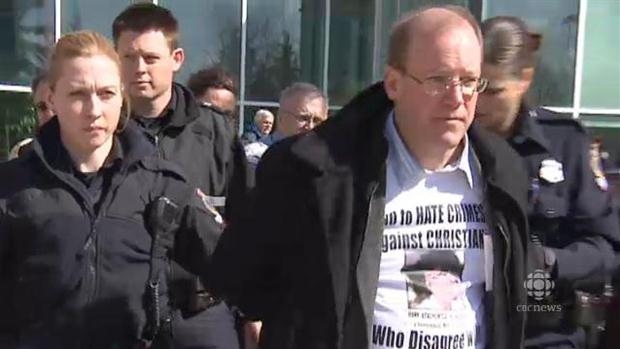 REGINA, Saskatchewan – A Canadian court has upheld the right of two Christians to distribute literature on university campuses despite dislike for their message, and has found the men not guilty of a mischief charge following their arrest this past spring.
REGINA, Saskatchewan – A Canadian court has upheld the right of two Christians to distribute literature on university campuses despite dislike for their message, and has found the men not guilty of a mischief charge following their arrest this past spring.
As previously reported, in April, Peter LaBarbera, the director of the U.S.-based Christian ministry Americans for Truth about Homosexuality, and Canadian activist Bill Whatcott were placed in handcuffs and escorted off the University of Regina campus when they refused to leave and stop distributing pamphlets on homosexuality and abortion.
“We are a diverse campus. We are a welcoming campus,” Vice President Tom Chase told reporters. “We celebrate that diversity, and our staff felt that the material and some of the things they had with them simply contravened that policy and we asked them to leave.”
But Whatcott asserted that the men had a right to be on campus and that they should not be censored for the content of their speech.
“I’m not leaving,” Whatcott told university officials after being barred from distributing the literature, according to reports. “You guys are intolerant and should be ashamed of yourselves for shutting down our message without even considering it.”
When Whatcott and LaBarbera proceeded with their outreach, they were arrested, charged with mischief and later released. LaBarbera was wearing a t-shirt with text regarding “hate crimes against Christians who disagree with homosexuality” when he was escorted away in handcuffs.
“I’m a Christian. I can’t hate people,” he told reporters after the incident. “We all struggle with sin—[Homosexuality] just doesn’t happen to be my sin. But the idea that you can’t have an open debate on homosexuality on a college campus and that some speech code is brought in to kick people off because they have a viewpoint that most students probably haven’t heard, seems to me to be pretty undemocratic.”
A trial was held in October, and on Monday, Judge Marylynne Beaton found both men not guilty, releasing a 27-page opinion that upheld the Christians’ right to disseminate their views under the Canadian Charter of Rights and Freedoms.
“I find that the purpose of Mr. Whatcott and Mr. LaBarbera attending the University of Regina was to communicate information and their actions were passive and non-aggressive,” she wrote. “Therefore, notwithstanding that the university may be private property, I find that [the Charter] may be used as a defense to a finding of mischief by interfering with university property as they had the right to communicate in a peaceful manner on university property.”
Beaton also stated that the university’s reasoning to remove the men and stop them from sharing their message in order to “prevent students from feeling discriminated against” was improper.
“I do not accept that the accused’s removal, in order to protect students from the accused message, represented a minimal impairment on freedom of expression,” she wrote. “In this case, the university’s response was disproportionate to the peaceful distribution of flyers and was not reasonable and demonstrably justified.”
LaBarbera says that he is pleased with the decision and hopes that it will be used as precedent for other free speech matters in the country.
“Hopefully, this ruling will open up door to a resurgence of true tolerance and freedom in Canada,” he wrote in an update on Tuesday. “The Left in Canada, as in the United States, does not want debate but rather control. They fear unfettered exposure to moral truth and compelling facts about homosexuality—hence their campaign to silence Christians and others who speak out against sexual immorality and gender rebellion.”
Whatcott concurred.
“I’m very happy with the judge’s decision,” he said, “and of course I believe she’s correct.”
As previously reported, last year, the Supreme Court of Canada upheld a conviction against Whatcott pertaining to his 2001-2002 distribution of flyers regarding the Bible’s prohibitions against homosexuality. Whatcott had distributed the flyers to raise awareness of his concerns about both the homosexual parades in Canada, as well as the vulnerability of children in a culture that promotes homosexuality. However, when Canada’s Human Rights Commission found out about the matter, they took him to court, citing him with a hate crime.
The Supreme Court noted in its opinion, among other concerns, that Whatcott’s use of the Bible to target homosexuals was a problem.
“[Whatcott’s] expression portrays the targeted group as a menace that could threaten the safety and well-being of others, makes reference to respected sources (in this case the Bible) to lend credibility to the negative generalizations, and uses vilifying and derogatory representations to create a tone of hatred,” the panel ruled.
It pointed back to the lower court ruling, which asserted, “While the courts cannot be drawn into the business of attempting to authoritatively interpret sacred texts such as the Bible, those texts will typically have characteristics which cannot be ignored if they are to be properly assessed in relation to … the [Hate Crimes] Code.”
The judges did note, however, that “it would only be unusual circumstances and context that could transform a simple reading or publication of a religion’s holy text into what could objectively be viewed as hate speech.”
Become a Christian News Network Supporter...


